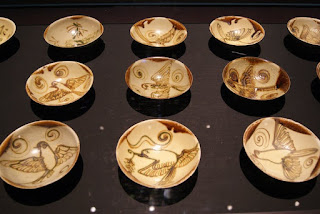10.2: Commercial Artefact Hunting
 |
| Belitung wreck cargo for sale |
When an artifact is removed from its original context in an archaeological site without carefully recording where it was found and what other kinds of items were associated with it, the artifact is lost to scientific study, and the positions of other things with which it was associated are usually disturbed too badly to recover any additional useful information. The loss of individual artifacts from archaeological sites is compounded when the collected artifacts are introduced to the marketplace. News about the sale of antiquities, especially when the items fetch high prices, only encourages members of the public who are unaware of the destruction caused by artifact removal from archaeological sites, or who don’t care about such destruction, to go out and collect more relics from archaeological sites. Regardless of whether the items they collect are for their private enjoyment, art projects, commercial gain, or other purposes, the practice of artifact collection without proper scientific documentation destroys more and more of our cultural resources. Giving, trading, or selling the artifacts to other private collectors further compounds the problem by making those relics unavailable for scientific study. For these reasons I always try to discourage individuals from collecting ancient artifactsCommercial artefact hunting in particular should be discouraged, as argued by the AIMA (Laws and Ethics), who note that damage is caused by treasure hunting, looting and commercial exploitation in particular when sites are left unmonitored and open to faster degradation, lack of or limited conservation for artefacts, further looting, vandalism, selective recovery of artefacts for sale, damage to the structure of the site to access artefact-rich areas, and the division of complete artefact assemblages, all of which cause irreparable damage to our shared heritage. "When portions of heritage are sold off and end up in private hands or collections, never to be viewed again by the public or become inaccessible for future research and reanalyses especially, as new methods and technology develop, we all lose".
These ideas are paralleled in the “Principles of Archaeological Ethics” of the Society for American Archaeology:
"Principle No. 3: Commercialization. The Society for American Archaeology has long recognized that the buying and selling of objects out of archaeological context is contributing to the destruction of the archaeological record on the American continents and around the world. The commercialization of archaeological objects—their use as commodities to be exploited for personal enjoyment or profit—results in the destruction of archaeological sites and of contextual information that is essential to understanding the archaeological record. Archaeologists should therefore carefully weigh the benefits to scholarship of a project against the costs of potentially enhancing the commercial value of archaeological objects. Whenever possible they should discourage, and should themselves avoid, activities that enhance the commercial value of archaeological objects, especially objects that are not curated in public institutions, or readily available for scientific study, public interpretation, and display.”The Chartered Institute for Archaeologists 'Code of conduct' (as last updated 15 October 2019) principle 1.7 also concemns involvemenrt in artefact hunting to obtain items to be bought and sold:
A member shall not knowingly be employed by, or otherwise contract with, an individual or entity where the purpose of the contract is directly to facilitate the excavation and/or recovery of items from archaeological contexts for sale, and where such sale may lead to the irretrievable dispersal of the physical and/or intellectual archive, or where such sale may result in an undispersed archive to which public access is routinely denied.Bibliography
Julie Hollowell-Zimmer 2003, “Digging in the Dirt: Ethics and 'Low-End Looting,'” in Ethical Issues in Archaeology, ed. Larry J. Zimmerman, Karen D. Vitelli, and Julie Hollowell-Zimmer, pp 45-56 AltaMira Press, Walnut Creek.
Renfrew, Colin. 2009. Loot, Legitimacy, and Ownership: The Ethical Crisis in Archaeology. London: Duckworth.
Stanford Report, 'Buying, selling, owning the past', Stanford Report January 28, 2009
Mark Staniforth Sunken ship yields silver booty, but should we let sleeping wrecks lie? The Conversation September 27, 2011
Kristina Killgrove, ' Five Reasons You Shouldn't Buy That Ancient Artifact' Forbes Jun 12, 2015
Hannah Pethen, 'The myths about illegal antiquities and why you should never buy them!' Archaeology and Egyptology in the 21st century July 26, 2017
Kirstin Fawcett, 'Don't Buy Ancient Artifacts You See Online—Most Are Looted or Fake' Mental Floss Nov 6, 2017
Alice Stevenson, 'Why archaeological antiquities should not be sold on the open market, full stop' The Conversation, July 13, 2017
Hannah Pethen, 'The myths about illegal antiquities and why you should never buy them!' Archaeology and Egyptology in the 21st century July 26, 2017
Kirstin Fawcett, 'Don't Buy Ancient Artifacts You See Online—Most Are Looted or Fake' Mental Floss Nov 6, 2017
Alice Stevenson, 'Why archaeological antiquities should not be sold on the open market, full stop' The Conversation, July 13, 2017
 Tamara Kroftova comments:
Tamara Kroftova comments:"Since the archaeological record is a limited resource and also so easily damaged, it seems pretty obvious that merely to dig it up so an individual can make a bit of cash is selfish and short-sighted. Treasure hunters are not doing it for the "love of the past", but to get rich - a practice that is promoted in the UK by the existence of Treasure awards at market value for merely obeying the law. It is truly disturbing that there is so little discussion of the concept in insular archaeological outreach to artefact hunter".


Comments
Post a Comment